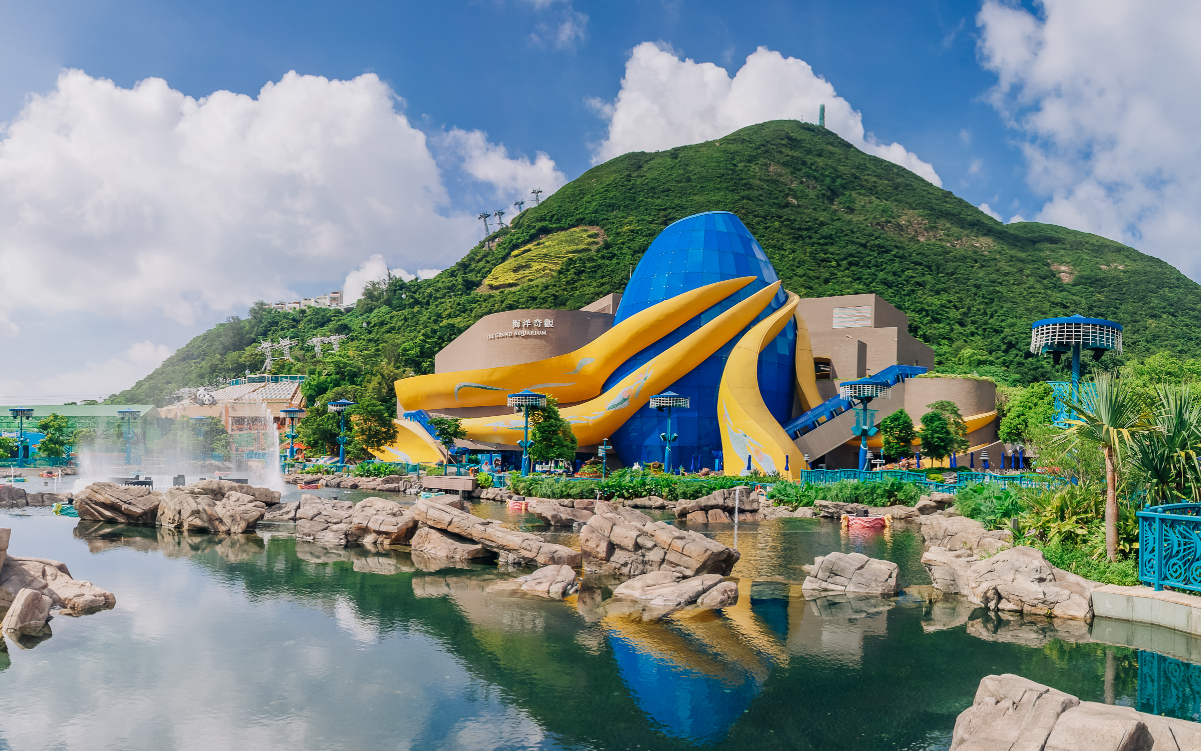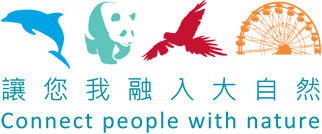オーシャンパークのことをもっとよく知ろう!
Ocean Park’s veterinary team performed an advanced intestinal surgery earlier, the first time ever in Hong Kong, on a stranded green turtle found in Silverstrand Beach, Clear Water Bay Peninsula, Sai Kung. The Park is now hopeful for a full recovery and subsequent release of the turtle. Findings from the surgery revealed a grave lesion caused by a stack of marine debris in the turtle’s body, leading it to a critical condition, which would have been fatal if it was not treated in time. Unfortunately, what happened to the rescued turtle was not an isolated incident; over the past five years, 12 out of 23 sea turtles that Ocean Park received from the Agriculture, Fisheries and Conservation Department (AFCD) were affected by marine debris, indicating the severity of marine pollution caused by human activities which poses a significant threat to all lives in the oceans.
The rescued green turtle, nicknamed “Elmo”, was spotted floating near the shark nets of Silverstrand Beach on 10 November 2015. It was inert and unresponsive, emaciated, severely dehydrated with a pair of sunken eyes. Her carapace was in good condition but some red paints and algae were found on it. After Elmo was initially stabilised, further in-depth examinations including x-ray, a CT scan and a series of endoscopy were carried out. These examinations revealed a fish hook, a substantial impaction, a large tear and a condition called an “intussusception” in her intestines, which would have been fatal if left untreated, the Park’s veterinary team thus decided to operate on Elmo.
During the surgery, conducted on 12 December 2015, the presence of an intussusception was confirmed, meaning that one part of the intestine had telescoped into the adjacent portion, causing an obstruction to the intestinal tract. Dr Paolo Martelli, Director of Veterinary Service, said, “Intussusception in sea turtles is generally linked to ingestion of foreign objects. Faecal material impacted at the intussusception site and leaking in Elmo’s abdomen contained fishing nets and fishing lines, a fishing hook, some plastics and large areas of sloughed necrotic tissues from her intestines. The portions of bowel involved in the intussusception were damaged beyond repair and had to be removed through a procedure called an intestinal resection and anastomosis. This procedure involves the removal of the affected segment, followed by surgically joining the two resulting healthy ends of the bowel on each side of the removed portion. This is an advanced, delicate surgical procedure performed by our surgeons for the first time on a sea turtle. It carries some post-operative risks, including the risk that the intestinal repair will not heal properly. It takes a long time, for sea turtles too, to recover from a major surgery. Nonetheless, Elmo is a tough girl and she has been recovering slowly but steadily. There is still a long road ahead to full recovery for Elmo but we are prepared to walk her through the journey, and so is Elmo.”
Ms Suzanne Gendron, Executive Director of Zoological Operations & Education, said, “Ocean Park has been collaborating with AFCD to care for stranded and confiscated sea turtles on a volunteer basis. Since 2000, the Park has received 41 sea turtles, 23 of which were returned to the wild, 15 failed to recover and 3 are presently still under the care of the veterinary and aquarium team of the Park. Between October 2011 and February 2016, 12 out of 23 sea turtles that Ocean Park received from AFCD were affected by marine debris. While some of the lucky ones have recovered after being treated, others have died. Elmo’s case is the most invasive surgery done to date in Ocean Park for the purpose of rehabilitating a sea turtle. We will continue to provide treatment and the best possible care to Elmo. When she is finally deemed physically fit for release, she will be taken back to the ocean. Like the other 23 sea turtles that were rescued and released to the wild, before Elmo is released, Ocean Park and AFCD will tag her with microchip, metal tag and satellite transmitter for identification purpose and collection of data regarding her movements and feeding patterns. The information will be important in aiding the formulation of conservation initiatives and protection of the species globally.”
Ms Gendron continued, “Elmo’s unfortunate experience shows how human activities, especially our pollution to the ocean, threaten marine lives. Not only will marine animals mistakenly ingest garbage in the ocean, they may also be entangled by marine debris such as fishing nets and lines. Therefore, we must alter the bad habits in our daily lives to conserve the ocean. For instance, do not throw any rubbish to the sea; avoid using plastic disposable products to reduce waste; bring your own bags, bottles and cutleries; remove garbage from wild areas, etc. If you come across sea turtles in poor condition, please call 1823 immediately to report their location to AFCD, which will help optimise the window for rescue.”
To spread the message of marine conservation to guests of Ocean Park, in 2014, Ocean Park launched a conservation movement, Blue Matters, which promotes a debris-free ocean through animal presentations, exhibit interpretives, education programmes and online platform. Earlier this year, a panel about the Park’s rescue efforts on sea turtles has been established in the Grand Aquarium and visitors will be able to see the marine debris found in Elmo. A new video about Ocean Park’s collaboration with AFCD on the rescue of stranded sea turtles is now available on the Park’s YouTube channel at: https://youtu.be/YGntEnjwG38
The rescued green turtle, nicknamed “Elmo”, was spotted floating near the shark nets of Silverstrand Beach on 10 November 2015. It was inert and unresponsive, emaciated, severely dehydrated with a pair of sunken eyes. Her carapace was in good condition but some red paints and algae were found on it. After Elmo was initially stabilised, further in-depth examinations including x-ray, a CT scan and a series of endoscopy were carried out. These examinations revealed a fish hook, a substantial impaction, a large tear and a condition called an “intussusception” in her intestines, which would have been fatal if left untreated, the Park’s veterinary team thus decided to operate on Elmo.
During the surgery, conducted on 12 December 2015, the presence of an intussusception was confirmed, meaning that one part of the intestine had telescoped into the adjacent portion, causing an obstruction to the intestinal tract. Dr Paolo Martelli, Director of Veterinary Service, said, “Intussusception in sea turtles is generally linked to ingestion of foreign objects. Faecal material impacted at the intussusception site and leaking in Elmo’s abdomen contained fishing nets and fishing lines, a fishing hook, some plastics and large areas of sloughed necrotic tissues from her intestines. The portions of bowel involved in the intussusception were damaged beyond repair and had to be removed through a procedure called an intestinal resection and anastomosis. This procedure involves the removal of the affected segment, followed by surgically joining the two resulting healthy ends of the bowel on each side of the removed portion. This is an advanced, delicate surgical procedure performed by our surgeons for the first time on a sea turtle. It carries some post-operative risks, including the risk that the intestinal repair will not heal properly. It takes a long time, for sea turtles too, to recover from a major surgery. Nonetheless, Elmo is a tough girl and she has been recovering slowly but steadily. There is still a long road ahead to full recovery for Elmo but we are prepared to walk her through the journey, and so is Elmo.”
Ms Suzanne Gendron, Executive Director of Zoological Operations & Education, said, “Ocean Park has been collaborating with AFCD to care for stranded and confiscated sea turtles on a volunteer basis. Since 2000, the Park has received 41 sea turtles, 23 of which were returned to the wild, 15 failed to recover and 3 are presently still under the care of the veterinary and aquarium team of the Park. Between October 2011 and February 2016, 12 out of 23 sea turtles that Ocean Park received from AFCD were affected by marine debris. While some of the lucky ones have recovered after being treated, others have died. Elmo’s case is the most invasive surgery done to date in Ocean Park for the purpose of rehabilitating a sea turtle. We will continue to provide treatment and the best possible care to Elmo. When she is finally deemed physically fit for release, she will be taken back to the ocean. Like the other 23 sea turtles that were rescued and released to the wild, before Elmo is released, Ocean Park and AFCD will tag her with microchip, metal tag and satellite transmitter for identification purpose and collection of data regarding her movements and feeding patterns. The information will be important in aiding the formulation of conservation initiatives and protection of the species globally.”
Ms Gendron continued, “Elmo’s unfortunate experience shows how human activities, especially our pollution to the ocean, threaten marine lives. Not only will marine animals mistakenly ingest garbage in the ocean, they may also be entangled by marine debris such as fishing nets and lines. Therefore, we must alter the bad habits in our daily lives to conserve the ocean. For instance, do not throw any rubbish to the sea; avoid using plastic disposable products to reduce waste; bring your own bags, bottles and cutleries; remove garbage from wild areas, etc. If you come across sea turtles in poor condition, please call 1823 immediately to report their location to AFCD, which will help optimise the window for rescue.”
To spread the message of marine conservation to guests of Ocean Park, in 2014, Ocean Park launched a conservation movement, Blue Matters, which promotes a debris-free ocean through animal presentations, exhibit interpretives, education programmes and online platform. Earlier this year, a panel about the Park’s rescue efforts on sea turtles has been established in the Grand Aquarium and visitors will be able to see the marine debris found in Elmo. A new video about Ocean Park’s collaboration with AFCD on the rescue of stranded sea turtles is now available on the Park’s YouTube channel at: https://youtu.be/YGntEnjwG38
- End -







